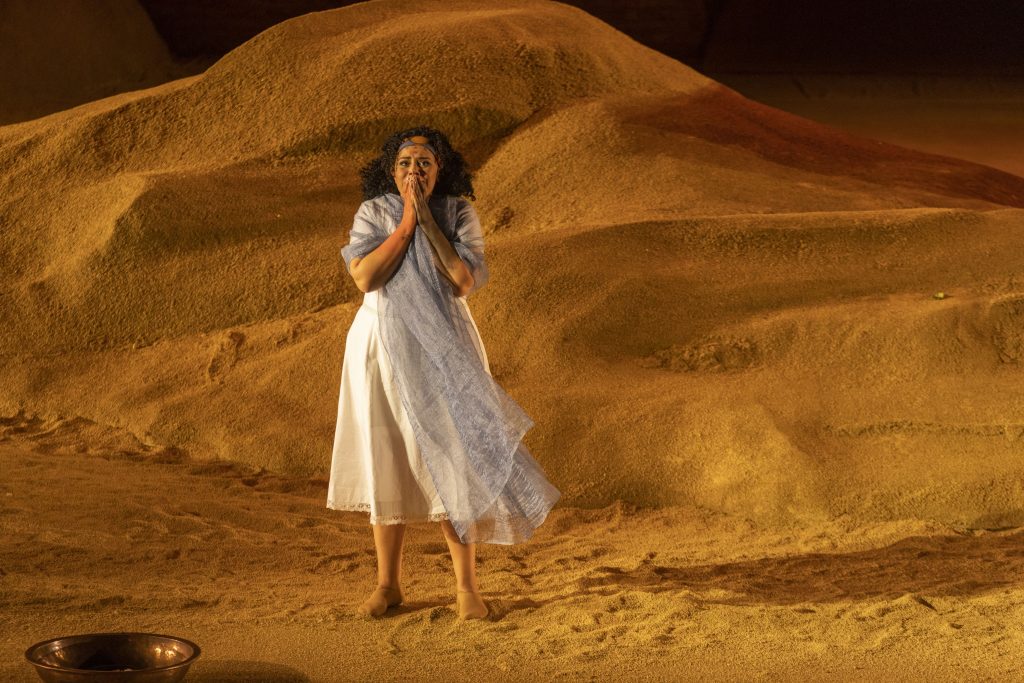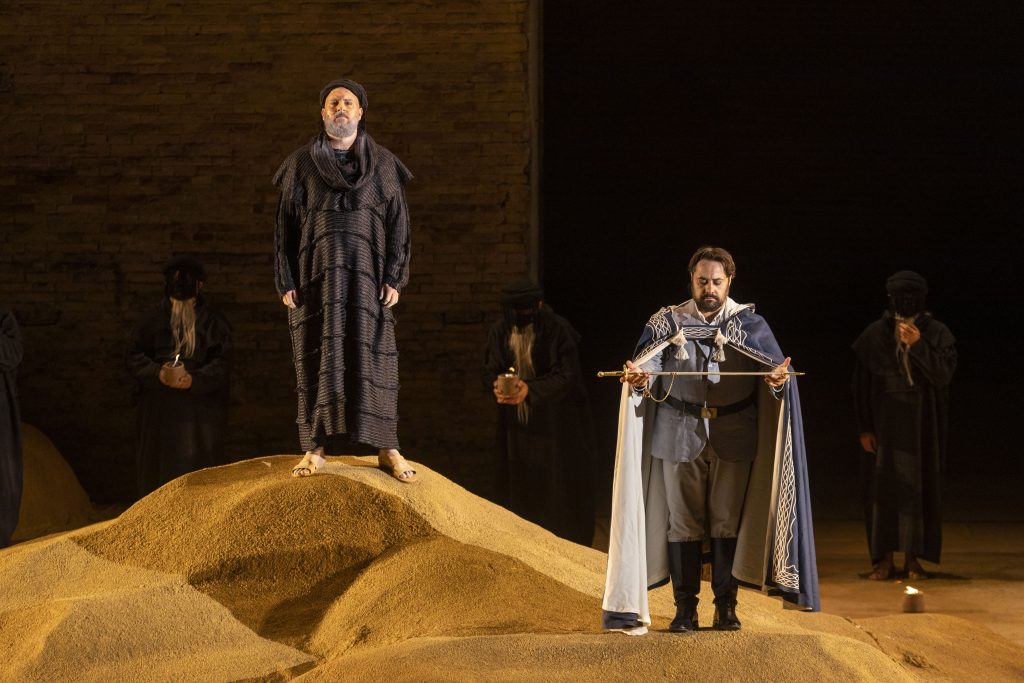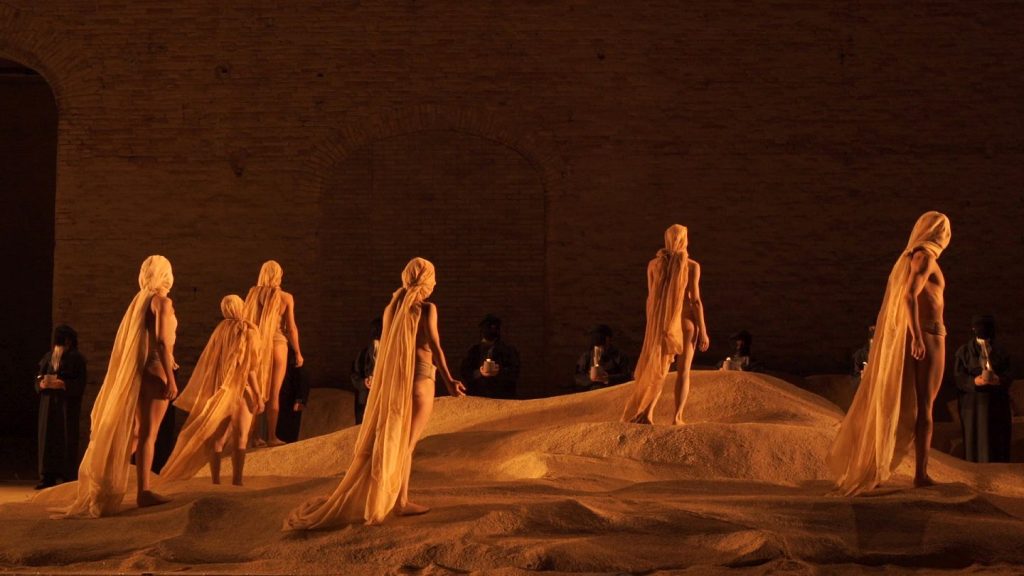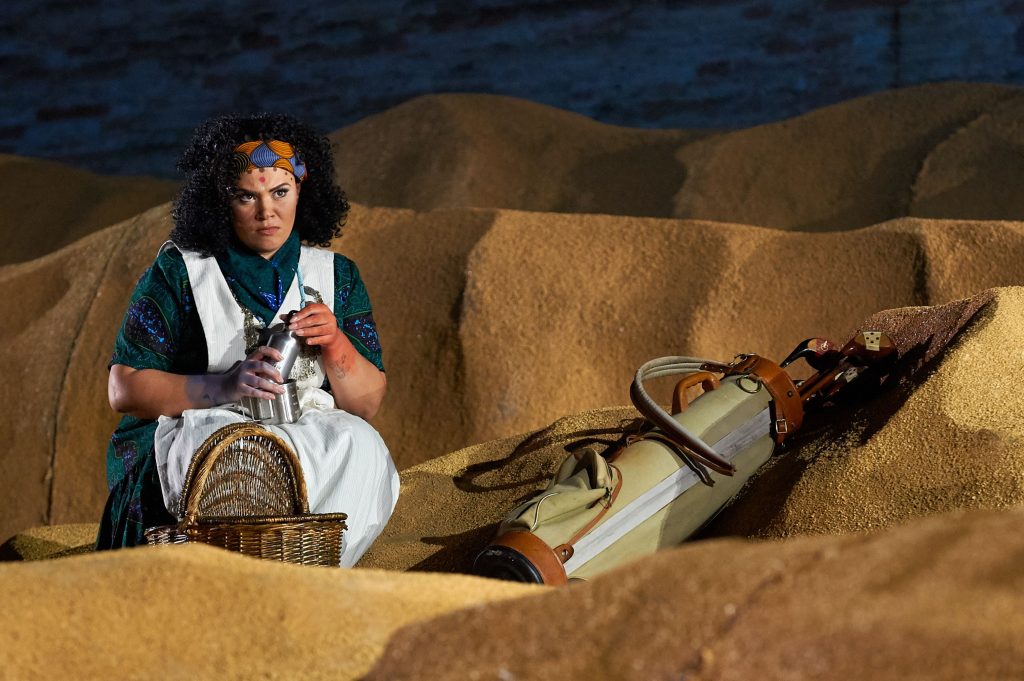AÏDA
MACERATA OPERA FESTIVAL 2021. ATTENDED PERFORMANCE 7 AUGUST 2021.
Aida: Maria Teresa Leva; Il Re: Fabrizio Beggi; Amneris: Veronica Simeoni; Radames: Luciano Ganci; Ramfis: Alessio Cacciamani; Amonasro: Marco Caria; Un messaggero: Francesco Fortes; Una sacerdotessa: Maritina Tampakopoulos; Conductor: Francesco Lanzillotta; Orchestra Filarmonica Marchigiana; Stage ensemble “Banda Salvadei”; Coro lirico marchigiano “Vincenzo Bellini”; Choir Master: Martino Faggiani; Direction: Valentina Carrasco.
Music: ****4****
Direction: *1*
One hundred years ago – on July 27, 1921, to be precise – the Sferisterio of Macerata, built towards the end of the nineteenth century as a place meant, above all, for sport events, was transformed into an open-air theater, inaugurated – similar to what had happened a few years earlier at the Arena di Verona – with a performance of Verdi’s opera universally considered to be the most suitable for vast open spaces, Aïda. That’s why we are celebrating that event this year. But those who had hoped (some, as we will see later, had rather feared it) that the Aïda of the centenary was a reinterpretation, albeit in a modern key, of a traditional staging, were wrong, and very much so. Valentina Carrasco didn’t even entertain the thought. Nor are we surprised, since – despite knowing her work all too well – when she began to talk, quite incongruously, about Shell advertising on posters from 1921 during the press conference presentation, we guessed that “her” Aïda would have had very little in common with Verdi’s.
In fact, after giving up – as she says in the interview published in the booklet – her initial idea to show us the Suez Canal, the director turned to a refinery (or is it an oil pipeline?) and from there she ran into a series of inconsistencies and nonsense, small and big. However, we chose to talk about this in a subsequent article, which you will find in Opera Gazet tomorrow, 18 August, because we know that the case is far from unique, and we believe that the issue of the distortion of opera by directors is important – indeed, deadly serious – and deserves to be tackled with special attention.
For now, we will deal with the musical part, which, without being exceptional, was nevertheless, on the whole, from good to excellent. In this case, we also had the good fortune of a double listening, since, while we witnessed the third performance, on August 7, RAI had broadcast the first one live on the radio, and although in these cases the sound is always a bit “flat”, compared to the brilliance of a live performance, we were able to form a fairly accurate idea, also because we had already heard, on other occasions, almost all the singers involved.

We can immediately divulge that in our opinion the weak link in the cast was the female part. We had listened to Maria Teresa Leva live for the first time about three years ago as Micaela, and she left a very good impression. But of course, the road from Micaela to Aïda – a role Leva first sang a couple of years ago in an event during the Parma Verdi Festival held in the small theater in Busseto – is not easily travelled. Her voice has some color but was not particularly endowed with “weight” or a strong personality. At times there was a slightly shrill sound in high notes, not what we usually associate with the role of Aïda. Penalized also by the director’s vision, who imagines her more as a servant than as a kind of companion (as Aïda is in the original text), she favors the aspect of Aïda as a victim rather than as a princess, focusing on the sweetness of the phrasing, enriched by fine pianissimi. The role will possibly mature over time, and we look forward to seeing it grow.
Alongside, or rather opposite her, Veronica Simeoni’s Amneris can only take advantage of her opponent’s weaknesses. Commenting on her Azucena, last year, we wrote – agreeing with the opinion of a large number of opera fans – that Simeoni is not a mezzo-soprano. She has neither the color, nor the “weight”, nor the vocal authority that a mezzo-soprano should have, and in fact, in what should be the highly dramatic duet between two princesses in love with the same man, it wasn’t easy – especially in the radio broadcast – to tell which was which. Nevertheless, all in all, the two voices find a balance which might have been difficult to get if one of them had been especially big or “heavy”. Simeoni sings well, she acts well, she also is a slender, good-looking woman, but to sing a role one needs, first of all, to have the right vocal means. If this were not the case, and if it were enough to know how to sing perfectly, from a technical point of view, then Tito Schipa or Alfredo Kraus would have sung Il Trovatore, or perhaps Othello. But that’s not how it works in opera. However, having made these reservations, we have no difficulty in admitting that her performance grew in the course of the evening, and that the fourth act, and above all the great Amneris scene, was undoubtedly effective.


Luciano Ganci, whom we greatly appreciated last year as Manrico in Trovatore, made his Radames debut only recently in 2020 at the Barcelona Liceu, just before opera went – or almost went – into its deep sleep as a result of COVID-19. The beauty of the timbre, the assurance and brilliance of the high notes, and the variety of phrasing are part of his baggage and are certainly not new to us. As for the character, his Radames already has, in our opinion, a good vocal and interpretative maturity. Having sung Aïda just a few times onstage, he may lack some experience in the role, and this seems to cause a little tension in the initial, insidious aria. After that moment, the tenor’s performance grows, from the “weapons scene” to the triumph, to the Nile scene (so to speak, since obviously there is no Nile here …), to culminate in a very remarkable fourth act, both in the duet with Amneris, and in the finale where the two protagonists have the opportunity to show off the piano and pianissimi they possess in their technical background. Therefore, an excellent Radames, who, in our opinion, has all the numbers to become, with more experience of the role, a great Radames.
Marco Caria‘s Amonasro is also excellent. He has a nowadays rare dark voice of a true baritone, and he keeps well away from the excesses of a certain vision of a barbarian, savage, and brutal warrior. His Amonasro is a king, and a father, who stands out for his authority and dignity.

On the whole, Alessio Cacciamani’s Ramfis is good, even if the voice lacks some of the weight, and also color, that will give the high priest his deadly authority. He is another artist who will probably mature in his role and who we look forward to in future productions. Fabrizio Beggi sings the role of the king with dignity, with his good bass voice, while we found Francesco Fortes as the messenger to be rather disappointing.
Finally, we feel we owe a special mention to the young Greek soprano Maritina Tampakopoulos who, in the few phrases granted to her by the role of the priestess, made us appreciate a voice of beautiful color, with an assured timbre and great personality. We hope to hear her again soon, in more demanding roles, as her future looks promising.
As for the strictly musical part, Francesco Lanzillotta, on his debut as the conductor of Aïda, had no easy task in an outdoor show and with an orchestra of a good level, but penalized by the distance and the plexiglass, and partly scattered on a stage measuring more than 100 meters. The conductor has undoubtedly tried to reconcile the many musical “faces” of Aïda, in particular the heroic one with the intimate one, and we appreciated the effort, even if we felt it was hasty at times, especially in the tight tempo of the finale of the Nile duet, actually considered by many a true cabaletta, but in this case perhaps running a little too fast. As always, the Coro Lirico Marchigiano, conducted by Martino Faggiani was excellent, and like other times it was slightly better in the male section.

[…] Marina Boagno, Opera Gazet […]
The reviews by Marina Boagno are always interesting, even if you can’t hear/see the performance.
The role of the Priestess may be small, but it is one of the most beautiful moments in the opera, in my opinion. I wish I could hear Maritina Tampokopoulos in this part.
Heerlijk om te lezen, Macerata wordt voor mij in 2022 opera waard. Na 2x Verona en 2x Torro del Lago Puccini. 🎼🌷🌷🌷🌷🎼
Ik zou even wachten op deel 2, Willem, morgen in Opera Gazet. 🙂